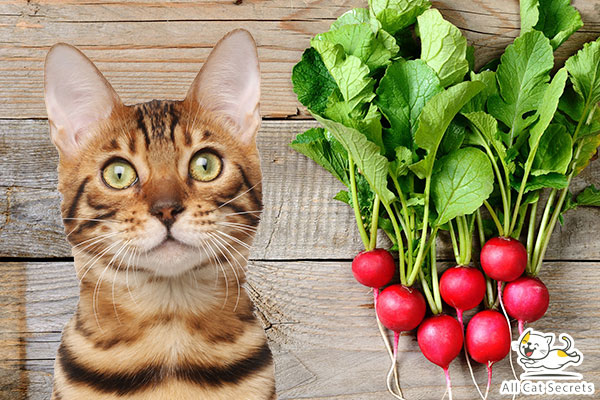It doesn’t matter whether you’ve owned a cat for one day or your entire life. You must already know that there are numerous human foods that cats can comfortably eat, as well as certain foods considered toxic to them.
If radishes happen to be a staple vegetable in your diet, you’ll occasionally find yourself wondering whether it’s safe to share these veggies with your feline friend. Like any cat owner in your situation, you may begin to ask, can cats eat radishes?
The short answer is yes, cats can eat radishes. Unlike common people foods like onions, garlic, and chocolate, radish isn’t immediately toxic to cats. So, your kitto won’t drop dead from snacking on these veggies.
But while cats can eat radish, they probably shouldn’t. Radishes are infamous for inducing a range of gastrointestinal issues in cats, including an upset stomach and abdominal discomfort. If you can find healthier options to radish, then by all means go for them.
Alternatively, only feed radish to your feline friend occasionally and in measured portions. And if you suspect that your cat has eaten radish behind your back, it’s important to move with speed to avert possible severe side effects.
Read on for everything you need to know before sharing radishes with your cats.
Table of Contents
Can Cats Have Radishes?
As we’ve just mentioned, cats can eat radishes. Radishes present no immediate danger to cats.
That said, there are always some side effects to watch out for. The most common issue with radishes is upset stomach. That underscores the importance of feeding this vegetable to cats in moderation.
Remember, cats are inherently obligate carnivores.
As an obligate carnivore, your feline friend can derive all his dietary requirements from a diet of animal protein. So, while cats can snack on plant-based foods occasionally, these products should never replace their main diet which mainly consists of lean meat. Too much fruit and veggies in their diet may prove more harmful than beneficial.
- High protein cat food dry formula with real chicken as the first ingredient
- Natural with prebiotic fiber nourishes specific intestinal bacteria for digestive health
- Wholesome cat food dry kibble with vitamin A and Omega-6 fatty acids to nourish skin and coat
Last update on 2024-07-07 / Affiliate links / Images from Amazon Product Advertising API
More About Radishes
As a cat owner who also happens to love radish, it’s not unusual to find yourself wondering, are radishes safe for cats?
We’ve already reiterated that the potential health benefits and risks of radishes for cats depend on the amount served. But before we delve further into the topic, it would be best to understand just what radishes are.
Radish is an edible root vegetable that belongs in the Brassica family. The vegetable is closely related to kale, broccoli, cauliflower, cabbage, turnips, mustard greens.
Radish bulbs, also known as globes, are available in numerous shapes, sizes, colors, flavors, and maturation periods. The most common one is the bright-red variety, which closely resembles the shape of a Ping-Pong ball with a small tail. Other common radish colors include white, black, and purple.
In terms of taste, most radishes are peppery. Some may also be sweet. The lighter the color, the milder the taste. But regardless of the variety, radishes have a way of becoming pungent if they remain uneaten for too long.

Health Benefits of Radishes for Cats
½-cup serving of raw radishes boasts the following nutritional profile;
- Calories – 12
- Protein – 0.35 grams
- Carbohydrates – 2.0 grams
- Fat – 0 grams
- Dietary fiber – 1 gram
In addition to the above nutrients, a ½-cup serving of raw radishes also contains considerable amounts of potassium, folate, niacin, riboflavin, vitamin B6, calcium, magnesium, zinc, copper, phosphorus, manganese, sodium, and vitamins C and K.
Here are the specific health and dietary benefits that your cat may derive from eating radishes;
1. Radish May Improve Digestion and Prevent Weight Gain
Like most vegetables, radishes are loaded with dietary fiber. Eating fiber-rich foods may aid digestion and prevent weight gain in various ways.
First, fiber may ease constipation by bulking up your cat’s stool. Bulkier stools are easier to eliminate.
Fiber may also nourish gut-friendly microbiota. These are the microorganisms, particularly bacteria, which live throughout an animal’s gut, where they support digestion while also protecting the animal against various digestive disorders.
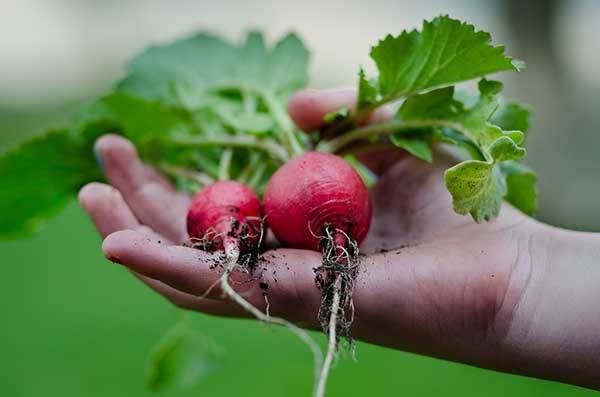
In terms of weight management, fiber may help to reduce the food portions an animal consumes in one sitting while also helping to create the sensation of fullness for longer. So, if you’re worried that your cat is gaining weight too fast, perhaps it’s time to introduce some radish into his diet.
Last but not least, fiber may improve blood sugar levels. That’s because much of the food moves through the stomach undigested. In the process, it takes with it any excess sugars in the stomach.
2. Radish May Protect Against Chronic Disease
Radish is also loaded with antioxidants. Examples include anthocyanins, myrosinase, glucosinolate, and isothiocyanate.
Consistent consumption of foods rich in antioxidants may help to protect against chronic diseases like cancer, diabetes, and heart disease. Antioxidants keep the risks of disease low by counteracting the potential adverse effects of free radicals in the body cells.
In fact, some studies have shown that drinking radish juice may prevent gastric ulcers. Other findings cite radish for its powerful antifungal properties.
Are Radishes Good For Cats?
Based on the potential benefits of radishes that we’ve highlighted above, it would seem as though these vegetables are perfectly good for cats. Radish contains certain health and dietary benefits that your feline friend may enjoy.
However, there’s a lot more to know about these veggies before feeding them to your kitto. The following section highlights a few things that could go wrong if your cat ate radishes.

Possible Health Issues That Radishes Can Cause In Cats
As we mentioned at the beginning, radishes are infamous for inducing an upset stomach. The fact that radish is a vegetable whereas your cat is inherently an obligate carnivore means there are always risks of gastrointestinal complications to watch out for. Symptoms of digestive distress include nausea and vomiting, diarrhea, flatulence, and abdominal discomfort.
Maybe you’ve always wondered, can radishes be harmful to cats?
Yes, radishes can surely harm cats. That’s because a cat’s digestive system is designed to process animal-based products and not plant-derived compounds. The saving grace, however, is that it will take a considerable amount of radish to cause real harm to cats. Again, this underscores the importance of practicing moderation when feeding radish to your kitto.
As a concerned cat owner who’s toying with the idea of sharing radish with his feline friend, you might also wonder, are cats allergic to radishes?
Cats tend to be more allergic to nuts than vegetables. But there are considerable risks of allergic reactions from radishes too. That’s especially if feeding these veggies to your kitto for the first time. The fact that radish isn’t typically found in regular cat food only increases the risks of allergy.
Radish allergy may present as symptoms of gastrointestinal complications. The symptoms may also be respiratory in nature, including difficulty breathing and a runny nose. Other common signs of radish allergy in cats include runny eyes, irritability, scratching, and dilated pupils.
- Works as a dog food topper - For pet parents looking for an alternative to capsules, raw treats, or soft chews, all it takes is a...
- A tasty & body nourishing treat for cats & dogs - Essential fatty acids for a healthy coat.
- Powerful Omega Fatty Acids - This premium fish oil liquid formula is loaded with the healthy Omega-3 fatty acid (with epa and dha)...
Last update on 2024-07-08 / Affiliate links / Images from Amazon Product Advertising API
Are Radishes Bad For Cats?
Now that we’ve examined the potential benefits and risks of radish for cats, it’s easier to make an informed decision before offering this vegetable to your feline friend.
But as to whether radishes are bad for cats or not, the answer remains that these vegetables are not immediately harmful.
Raw versus Cooked Radish for Cats
If you’ve decided to share radish with your cat, your next dilemma will be deciding whether to serve this vegetable raw or cooked. So, which between these options is preferable?
Can Cats Eat Raw Radishes?
Cats can eat raw radishes, alright. But you’re probably better off cooking the vegetable before serving it to your feline friend.
Raw radish may contain harmful bacteria, fungi, or pesticide chemicals. While washing may mitigate the effects of these chemicals and microorganisms, it may not render the vegetable entirely safe for cats.
Raw radishes may also be too tough for cats to chew and digest. That’s especially true for radish bulbs.
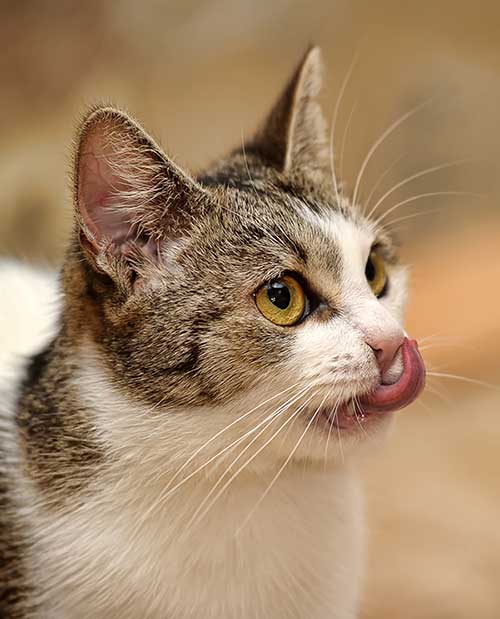
Can Cats Eat Cooked Radishes?
Not only can cats eat cooked radish, but experts actually recommend cooking radishes (and most other pet-safe vegetables) before feeding them to cats. Cooking helps to denature any harmful chemicals and bacteria in raw radishes.
But as you shall find, the cooking method matters a lot.
While there’s more than one way to prepare radish for your kitto, your best bet is to boil or steam the vegetable over moderate heat. Also, avoid any cooking methods that involve the use of salt, spices, and too much fat.
Can cats eat boiled radish?
Yes, boiling is one of the best ways to prepare radish for cats.
Can cats eat fried radish?
Radish meant for cats shouldn’t be fried as frying involves the use of excess fat. High-fat foods are a risk factor for obesity, diabetes, and a range of other chronic diseases.
Can cats eat grilled radish?
Grilling involves the addition of spices and fats. Both ingredients are potentially harmful to cats. So, cats shouldn’t eat grilled radish.
Can cats have radish chips?
The toxicity of radish chips for cats depends on the specific ingredients in the food. Chips prepared with excess condiments and spices are definitely harmful to cats.
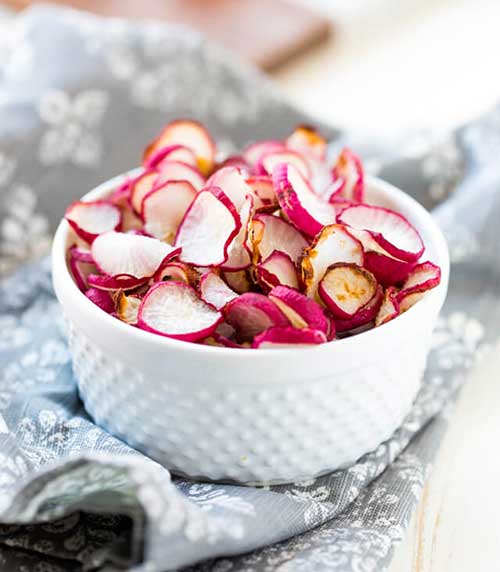
Are cats allowed to eat pickled radish?
Pickled radish may contain salt, seasonings, and vinegar. All these ingredients are considered toxic to cats.
It’s also important to understand how to serve radishes to cats. The conventional wisdom is to cut the vegetable into small pieces before giving it to your cat. That will reduce choking hazards.
You could also be wondering, how much radish can my cat have?
Well, there’s no standard rule to follow except that you should practice moderation. Too much radish for cats may induce serious side effects.
Are All Radish Parts and Varieties Safe For Cats?
All radish varieties are edible. They only differ in colors and flavors. Most parts of the radish plant are also edible. But can the same be said about cats? Let’s find out.
Can Cats Eat Daikon Radishes?
Daikon radish is considered exotic in most countries. That said, you may be wondering, is Daikon radish safe for cats? Yes, the Daikon radish variety is perfectly safe for cats.
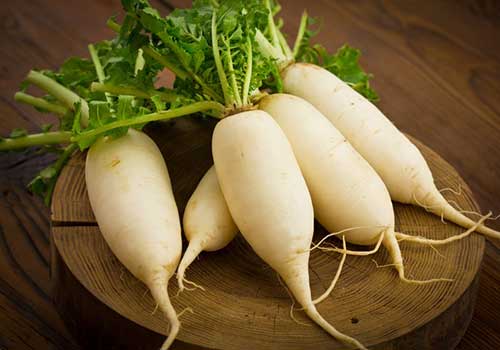
Can Cats Eat Korean Radish?
The Korean radish is another popular radish variety that cats can eat.
Can Cats Eat Chinese Radish?
There’s nothing special about Chinese radish except that it’s a distinct radish variety. So, just like Korean and Daikon radishes, cats can definitely eat Chinese radish.
Can Cats Eat Horseradish?
Although slightly different, both radish and horseradish belong in the same family of vegetables. That makes it safe for cats to eat too.
Are Radish Leaves Poisonous To Cats?
Radish leaves are just as safe for cats as various other parts of the plant.
Are Radish Greens Safe For Cats?
Radish greens are pretty much the same as radish leaves. Since cats can eat radish leaves, it goes that they can eat radish greens too.
Can Cats Eat Radish Microgreens?
Just like fully-grown radish leaves, radish microgreens are also safe for cats.
Can Cats Eat Radish Sprouts?
Again, the answer is yes. In fact, radish sprouts are probably the softest parts of raw radish, which makes them even safer for cats.
Can Cats Eat Radish Seeds?
Cats can eat radish seeds but you probably should consider other parts of the plant as the seeds could pose choking risks.
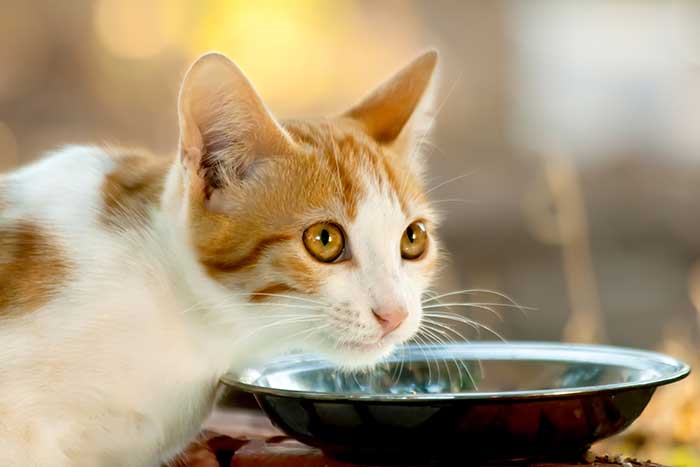
Should Cats Eat Radish?
Radish isn’t immediately toxic to cats. In fact, the vegetable may offer certain health and dietary benefits.
However, radish is notorious for inducing an upset stomach. Fortunately, there are numerous alternatives to radish for cats, including cabbage, cauliflower, Brussels sprouts, carrots, and asparagus.
Checkout Our Favorite Cat Products
1. Best Online Course For Cat Parents
Our favorite: The Cat Language Bible (How to Finally Understand And Speak to Your Cat) – A new form of cat to human communication that many cat owners have dreamed about… but few have actually thought possible.
2. Best Immune Support For Cats
Our favorite: Tomlyn Immune Support – Best Supplement for Cats and Kittens.
3. Best Cat Treats
Our favorites: LIFE ESSENTIALS All Natural Freeze Dried Chicken And Sheba Meaty Tender Sticks – Both are Great.

